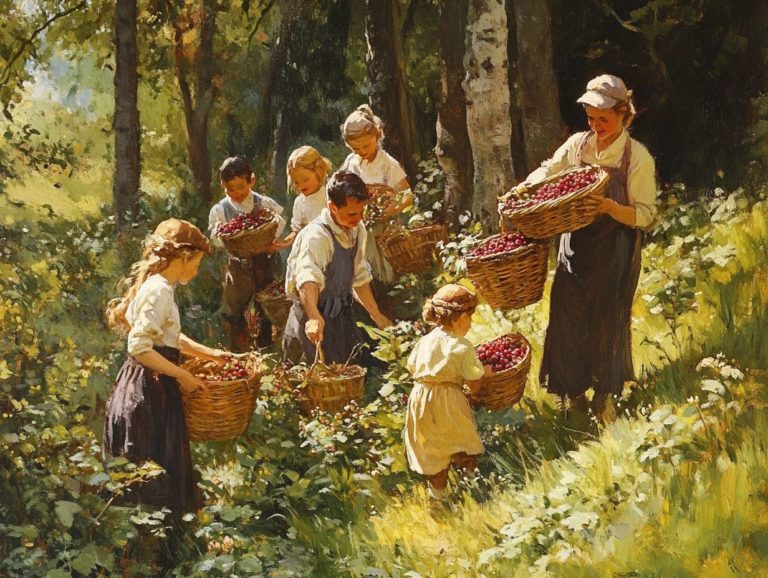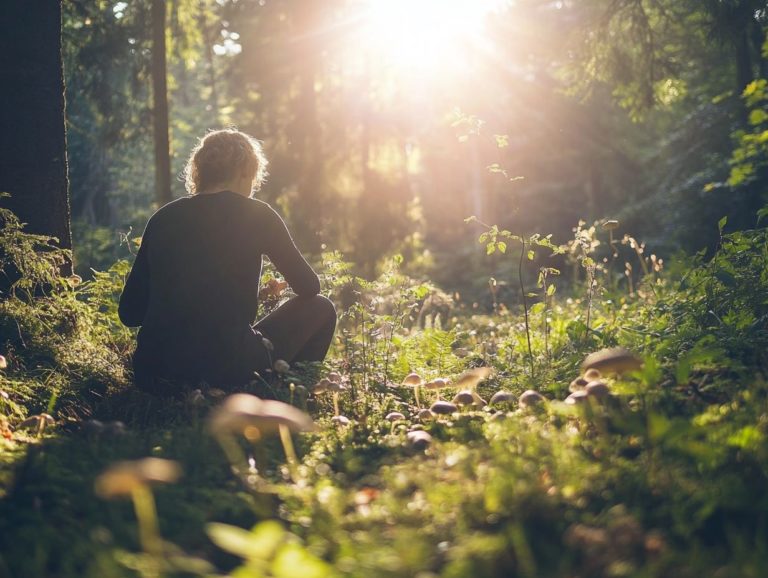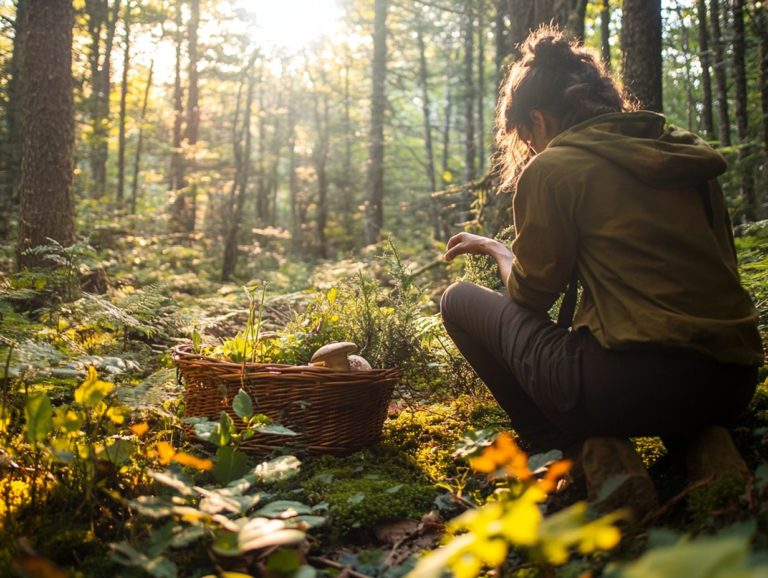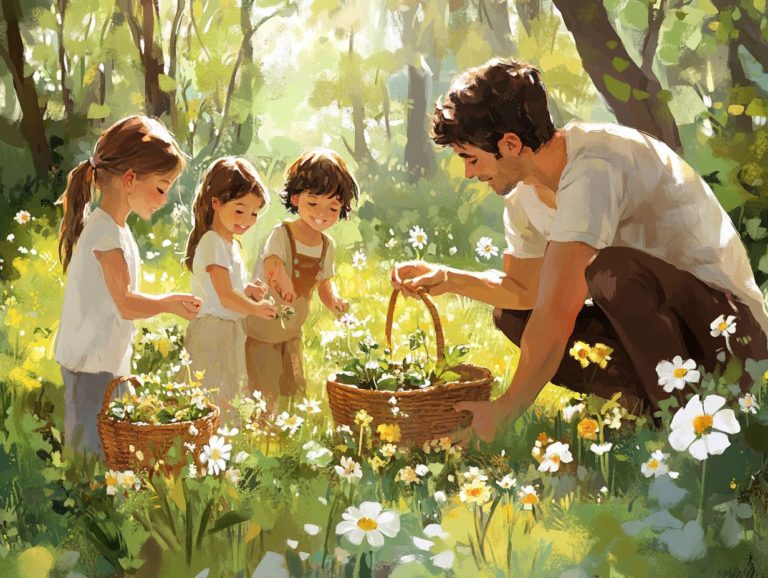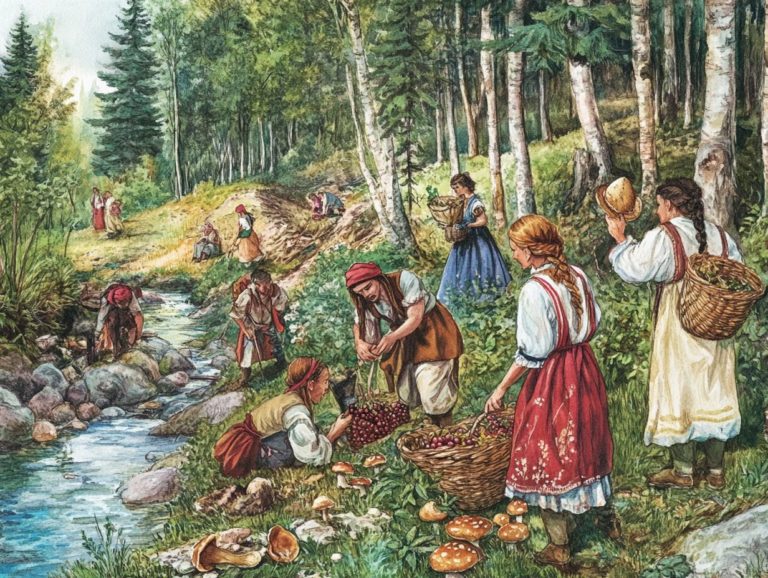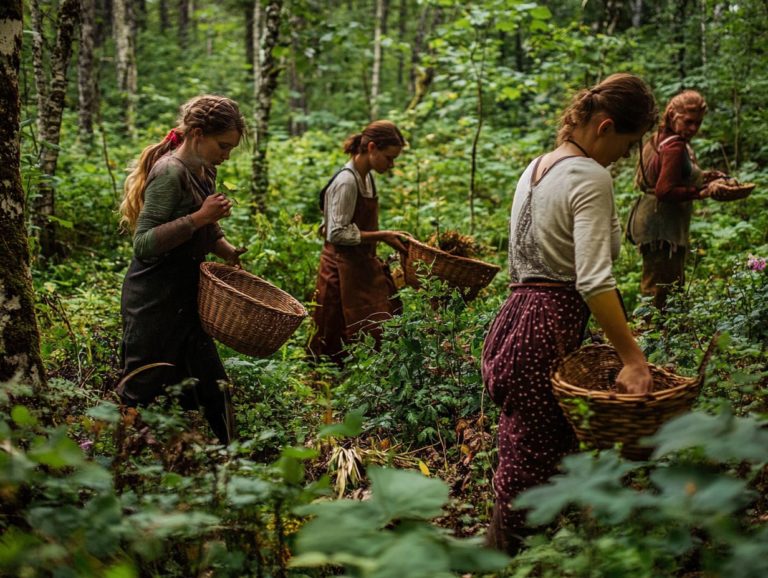How to Share Your Foraging Skills
Foraging transcends mere food gathering; it s an important practice that weaves together your connection to nature and your community.
By sharing your foraging skills, you cultivate a sense of belonging, champion sustainability, and enrich your personal well-being. This article delves into the myriad benefits of imparting these skills, offering practical strategies to teach others, as well as tips for conducting engaging and safe workshops.
Whether you re an accomplished forager or just embarking on this journey, there s something valuable for you here. Dive in now and discover the joy of sharing foraging!
Contents
- Key Takeaways:
- Benefits of Sharing Foraging Skills
- How to Share Your Foraging Skills
- Preparing for a Foraging Workshop
- Conducting the Foraging Workshop
- Frequently Asked Questions
- What are some ways to share my foraging skills with others?
- What are the benefits of sharing my foraging skills with others?
- How can I make sure I am sharing accurate and safe foraging information?
- Can I share my foraging skills with children?
- What are some tips for effectively sharing my foraging skills?
- Is it important to get permission before foraging on private property?
Key Takeaways:
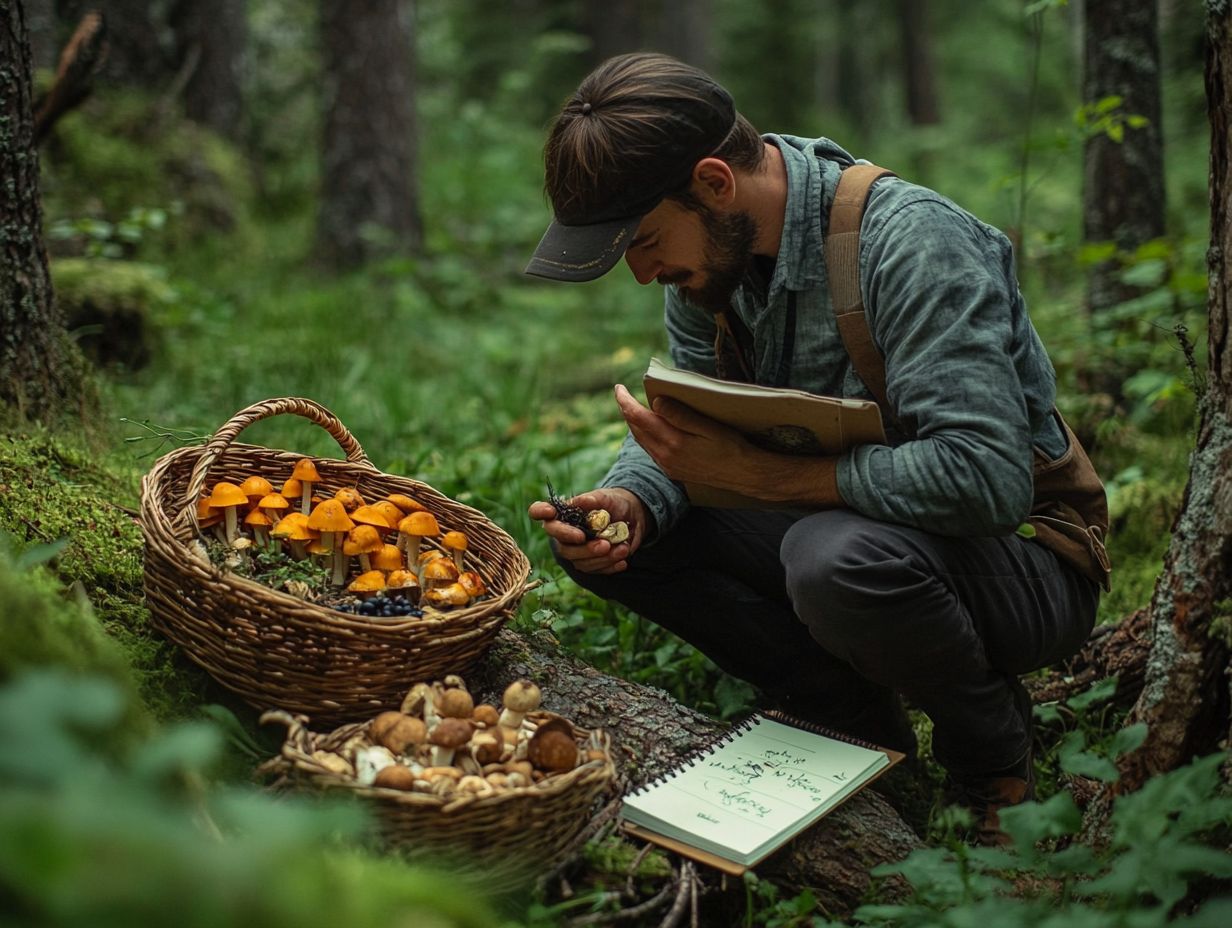
- Sharing your foraging skills not only benefits your community but also brings personal satisfaction and fulfillment.
- Before teaching, identify your audience and choose a teaching method that best suits their needs and learning styles.
- Prepare for a successful foraging workshop by gathering materials and creating a thorough lesson plan, while ensuring safety and sustainability for the participants.
What is Foraging?
Foraging is your gateway to discovering and harvesting wild edible plants, mushrooms, and medicinal herbs. It s not just a skill; it s a profound way to connect with nature. Think of it as a modern-day echo of what Adam and Eve might have experienced, where understanding the variety of plant and animal life in a specific habitat becomes essential for identifying which wild foods are safe to eat.
This practice, rooted in our ancestors’ reliance on the earth for sustenance, is making a comeback today. It s not solely about survival; it s about cultivating a deeper appreciation for biodiversity and embracing sustainable living.
When foraging, ethical practices are key being responsible and careful when foraging to protect nature. You ll want to preserve natural habitats and respect the plants and fungi you harvest, ensuring that future generations can also enjoy these treasures. Safety should always be at the forefront of your mind; use reliable identification techniques and avoid picking in contaminated areas.
To assist you on this enriching journey, consider exploring these invaluable resources:
- Websites like Wild Edibles
- Local foraging classes that offer hands-on experience
- A selection of informative books that dive deep into the art and science of foraging.
Benefits of Sharing Foraging Skills
Sharing foraging skills not only elevates your personal survival abilities but also cultivates a close-knit community that values the treasures of wild edible fruits, mushrooms, and medicinal herbs found in nature, especially through mastering the art of wild foraging techniques.
By imparting your knowledge of foraging to others, you foster a culture of sustainability and well-being, highlighting the significance of understanding local flora. This includes familiar plants like dandelions and elderberries, as well as learning how to use local resources for sustainable foraging.
This journey not only enriches your own life but also inspires those around you to connect with nature in meaningful ways.
Benefits for the Community
You’ll find that sharing foraging skills brings immense benefits to the community, fostering sustainable practices and a deeper connection to the local environment. When you and others come together to explore wild foods and edible plants, you not only acquire valuable knowledge but also cultivate a sense of responsibility toward preserving natural resources. Consider these tips for starting your own foraging group to enhance your experience.
This collaborative effort enhances food security, which means having reliable access to enough affordable and nutritious food, by providing access to nutritious, locally sourced options, which is especially crucial in urban areas.
As you and your fellow community members become more attuned to biodiversity, you re likely to initiate efforts to protect local ecosystems. For example, participating in community foraging events and workshops offers practical experiences that empower you to identify edible plants safely.
These gatherings do more than just build relationships; they spark a passion for conservation, allowing local groups to thrive as they share knowledge and support one another s initiatives.
Personal Benefits
Engaging in foraging offers you a multitude of personal benefits, from acquiring essential survival skills to savoring the fresh, nutritious wild foods that nature has to offer. As you learn to identify and harvest edible plants, mushrooms, and medicinal herbs, you’ll enjoy a wider variety of foods and deepen your appreciation for the natural world.
This journey into the wild enhances your nutrition while nurturing your mental well-being. You ll feel joy and excitement as you uncover unique flavors. One enthusiast captures it perfectly: “Every time I step into the woods, I feel a weight lift off my shoulders, and I can t help but smile at the bounty around me.”
The simple act of foraging encourages mindfulness, connecting you to your environment in a way that supermarket produce never could. Exploring the wilderness opens you to rich sensory experiences, making each foraging expedition not just about gathering food, but also about rediscovering the sheer joy of being alive.
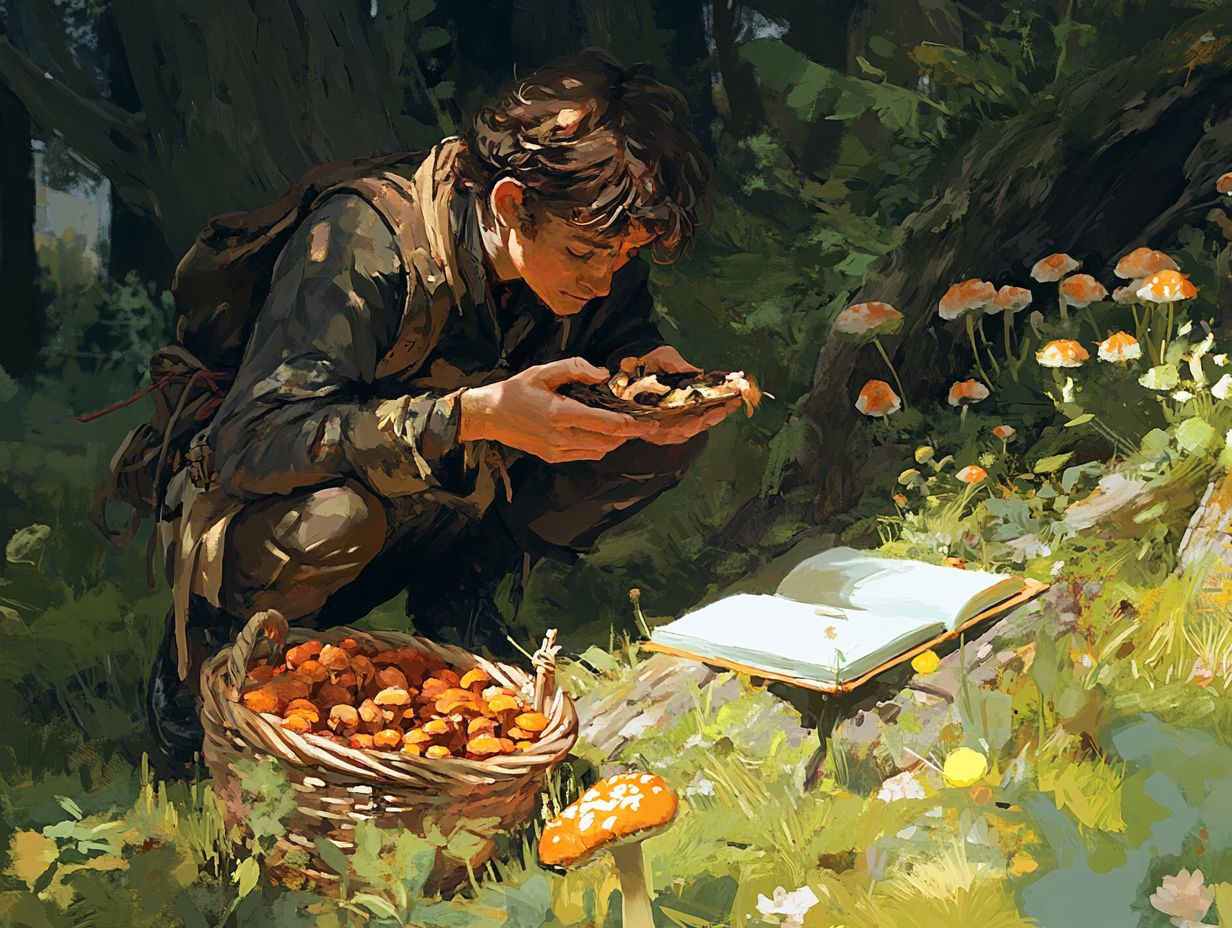
Effectively sharing your foraging skills demands a thoughtful approach. Start by identifying your audience and selecting the most suitable teaching methods to engage them. Additionally, you can explore how to use social media for foraging tips to reach a wider community.
Whether you’re leading foraging classes or sharing knowledge with friends, understanding their interests and skill levels empowers you to tailor your lessons. This personalized approach enhances their learning experience and fosters a deeper appreciation for how to use foraging techniques in cooking.
Identifying Your Audience
Identifying your audience is essential when sharing foraging skills. It directly influences how you craft and deliver your lessons. Whether your audience consists of eager novices keen to explore wild edible plants or seasoned foragers seeking to hone their expertise will shape your instructional approach and resources.
Age and interests are important in determining the type of content you offer. For example, younger audiences may prefer engaging formats like videos or social media posts, while older individuals might appreciate in-depth articles or workshops that encourage personal interaction.
By tailoring your content, you enhance engagement and ensure it resonates with your audience. Considering these factors allows you to create workshops, guides, or online resources that specifically address the diverse needs of your learners, ultimately elevating their overall experience.
Choosing a Teaching Method
Selecting the right teaching method is crucial for effectively sharing foraging skills. Choose from hands-on workshops or engaging classes that dive into foraging theory, including essential safety tips and ethical considerations.
By blending learning through experience with visual demonstrations, you engage your senses, making the entire experience more memorable and impactful. For example, encountering edible plants in their natural habitat can enhance your understanding and retention.
Use digital resources like interactive apps or online tutorials to enrich your learning journey. Each of these teaching approaches not only makes the process enjoyable but also underscores the importance of ethical foraging practices. This ensures you recognize the significance of sustainability and respect for nature while acquiring these invaluable skills.
Preparing for a Foraging Workshop
Get ready for an exciting foraging workshop with some smart planning! Preparing for a workshop requires meticulous planning and organization to guarantee a productive and engaging experience for participants. Collect everything you’ll need for a successful workshop!
Formulating a comprehensive lesson plan is equally essential, as each step contributes significantly to the workshop’s overall success. Your attention to detail will elevate the experience, making it both enjoyable and informative for everyone involved.
Imagine the fresh scents of wild herbs as you forage, joining the adventure of foraging!
Gathering Materials and Resources
Gathering the right materials and resources is crucial for a successful foraging workshop, as it greatly enhances your understanding and engagement. Essential items may include:
- Identification guides
- Safety equipment
- Sampling containers for collecting wild foods
- Educational resources about local edible plants and herbs
Incorporating visual aids, such as charts that showcase both edible and poisonous species, can significantly elevate your safety and awareness. Tools like hand lenses for close-up examination and baskets for gathering enrich your hands-on experience.
It s also vital to include books featuring illustrations and detailed descriptions of both safe and hazardous plant species. This knowledge empowers you to make informed choices while foraging. By offering a well-rounded selection of resources, the workshop not only educates but also instills a sense of confidence as you explore the wild.
Creating a Lesson Plan
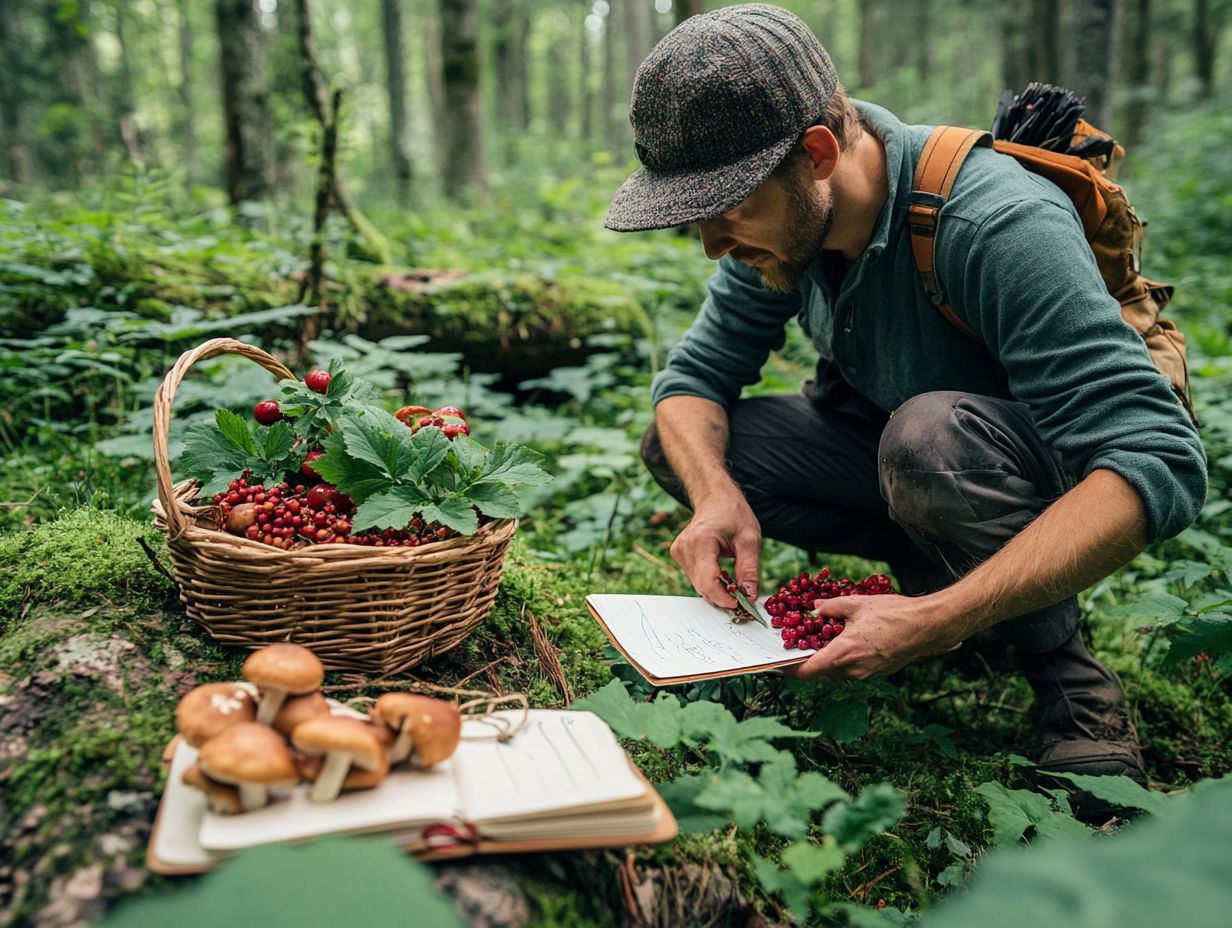
Get ready for an unforgettable adventure into the world of foraging! Creating a comprehensive lesson plan is vital for running a successful foraging workshop. It lays out the objectives, activities, and assessments that will guide your participants on their journey. A well-structured plan should cover essential topics such as identifying edible plants, safety tips, and a simple method to determine if a plant is safe to eat, ensuring that everyone walks away with valuable skills.
Beyond these foundational elements, your lesson plan should highlight interactive components that engage attendees and enhance their learning experience. Think hands-on plant identification, lively group discussions, and immersive field exercises that promote collaboration and reinforce retention.
By incorporating different assessment methods like quizzes and practical demonstrations you can effectively gauge understanding and offer personalized feedback.
By blending informative content with engaging formats, you ll create a dynamic atmosphere in your workshop that motivates participants and empowers them with confidence in their newfound knowledge.
Conducting the Foraging Workshop
Conducting a foraging workshop is all about using effective teaching strategies alongside a steadfast commitment to safety and sustainability. By engaging participants in meaningful discussions and hands-on activities, you not only elevate their learning experience but also cultivate a profound sense of responsibility for the environment and the wild foods they uncover.
This approach transforms the workshop into a memorable journey, fostering both knowledge and appreciation for nature’s bounty.
Tips for Engaging Participants
Engaging participants during a foraging workshop is crucial for maximizing their learning and creating an enjoyable experience. You can achieve this through a variety of thoughtful strategies. By incorporating interactive elements like group discussions, hands-on activities, and real-life foraging scenarios, you ll encourage enthusiasm and active involvement.
Asking open-ended questions will motivate attendees to share their thoughts and experiences, fostering a rich dialogue that enriches the learning experience for everyone. Including fun games that challenge your foraging knowledge allows participants to connect in a playful way, enhancing their retention of information. Using multimedia resources like videos and presentations captures attention and makes complex concepts easier to understand.
Ultimately, creating a welcoming environment where curiosity is nurtured and questions are encouraged is essential. This approach not only boosts participants’ confidence but also cultivates a sense of community, making the entire experience more memorable and impactful.
Ensuring Safety and Sustainability
Ensuring safety and sustainability during a foraging workshop is essential for your well-being and the environment. You ll learn how to identify poisonous plants and apply the universal edibility test, which helps determine if a plant is safe to eat. We’ll also discuss ethical foraging practices that promote responsible wild food harvesting.
You ll gain the skills to recognize local toxic species and understand the regulations that govern foraging in your area. Familiarity with these guidelines is crucial to avoid harmful encounters and protect the diverse ecosystems you ll explore.
When you forage, remember to harvest only what you need. Leave enough for wildlife to thrive, ensuring a balanced ecosystem. Fostering a commitment to stewardship ensures that your foraging activities do not deplete resources or disrupt local habitats, ultimately creating a positive impact on both nature and community awareness.
Frequently Asked Questions
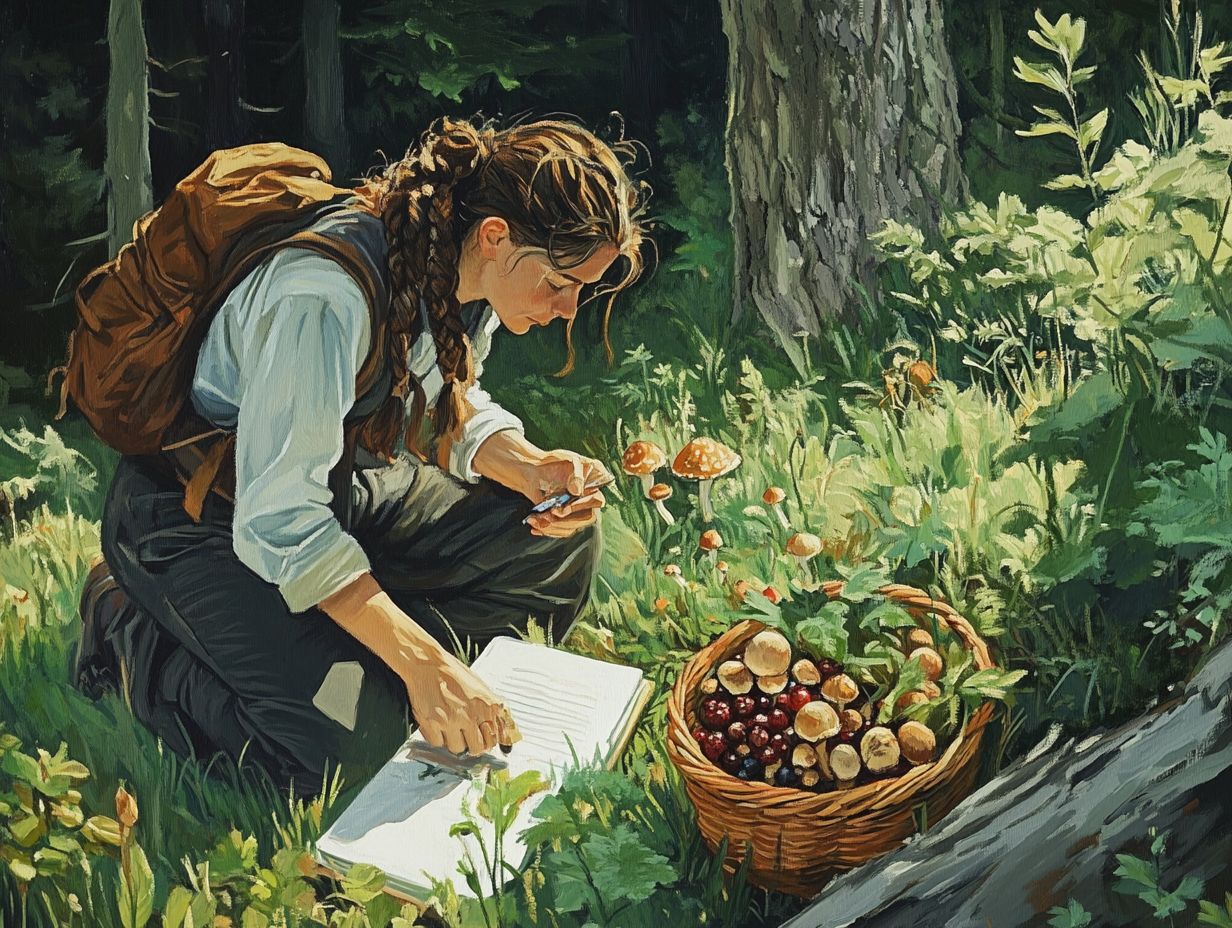
Some ways to share your foraging skills include hosting a foraging workshop, offering guided foraging tours, creating online tutorials or videos, or spreading awareness on foraging techniques by volunteering at community events.
What are the benefits of sharing my foraging skills with others?
Sharing your skills helps educate and empower others, allowing them to connect with nature and their food sources. It fosters a sense of community and connection with like-minded individuals.
How can I make sure I am sharing accurate and safe foraging information?
Before sharing your skills, it’s important to do thorough research and practice safe foraging techniques. You might also consider teaching foraging techniques to kids or partnering with an experienced forager for guidance.
Absolutely! Sharing your foraging skills with children is a fantastic way to teach them about the natural world and how to teach kids about foraging, promoting a healthy, sustainable relationship with food.
What are some tips for effectively sharing my foraging skills?
To share your foraging skills effectively, be prepared, use hands-on activities, provide resources for further learning, and encourage questions and discussions, including insights from how to use foraging to educate others.
Is it important to get permission before foraging on private property?
Yes, it s essential to get permission before foraging on private property. This respects the landowner and ensures you forage safely and legally.
Join us in a workshop to discover the wonders of foraging!

